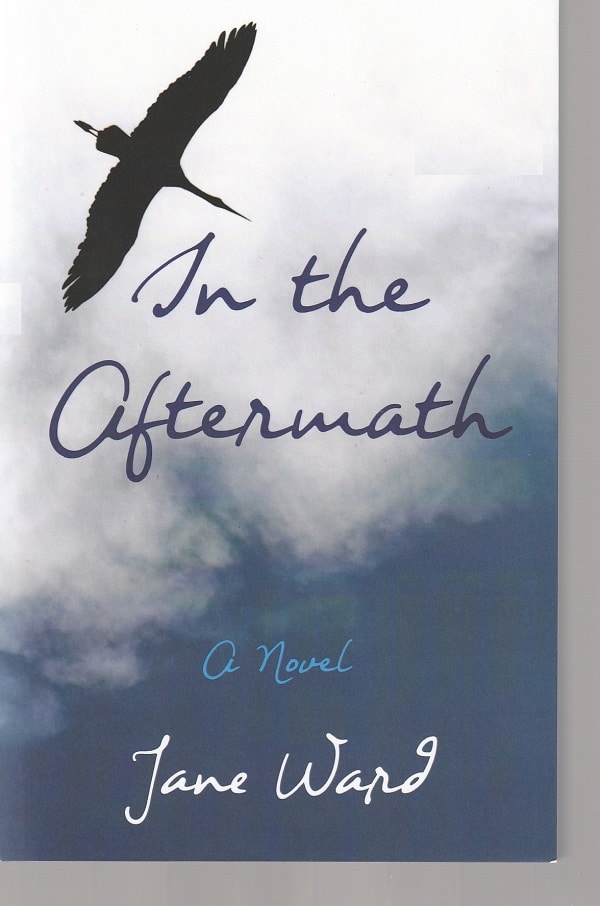Jane Ward’s In the Aftermath is an earnest, even affecting examination of the strong waves of guilt, sadness and anger among family and friends that follow the suicide of a loved one. David Herron’s walk to death in the waves of the Atlantic Ocean sparks suffering in the lives of a dozen people and has grave consequences for one.
This is a middle-class, even upper-middle class, story about ambition gone wrong, fear and secrecy, betrayal and failure. Herron’s desperation is brought about when he and his wife Jules open a fancy pastry bakery in a Boston suburb and then seek to expand, only to be caught in the recession of 2008, over-extended and vulnerable.
Herron knows how bad things are, but not his wife nor his 12-year-old daughter. He hasn’t told them how dire the financial situation is. His brother-like best friend Charlie doesn’t know when, on that last day, Herron reaches out to him for help.
His tough-preaching banker father does know, and Herron also reaches out to him for help on his last day.
And, in his final hour, Herron feels alone and a failure. In all the hours after that, his family and friends have to live with what he has done.
Last act
For the general reader, In the Aftermath is likely to be a poignant novel in which a wide array of people deal with many difficult-to-handle emotions in the aftermath of Herron’s last act.
However, for anyone who has lost a relative or friend to suicide, this novel could be upsetting and stir up difficult memories. Or it could be irritating.

That was my reaction, irritation. My brother took his life nearly six years ago, and I’m still living with the aftermath of that act, for bad and for good.
Ward’s general readers are likely to find In the Aftermath a worthy entertainment. So maybe I should offer my apologies here for raising some less than entertaining issues in this review.
Lost souls
The general reader, I suspect, will read In the Aftermath and find it easy to relate to its characters, people who are going through the normal everyday activities of shopping, dropping kids off at school, cooking, doing laundry, getting tasks done in the workplace, dealing with workplace colleagues who are more or less personable.
Herron’s suicide takes all of those normal activities and poisons them for many of the characters who, to one extent or another, become lost souls. This adds to their attractiveness as figures in a novel, makes them more interesting.
For me, Ward’s depiction of the people around Herron seemed too glib, too much on the far end of the continuum. And, yet, also too simple.
What I saw in the aftermath of my brother’s suicide was much less dramatic. My brother’s death left deep scars, but they were, I think, more subtle, less sensational. Most of his family and friends, it seemed, did not experience his loss as a life-altering event.
Again, the general reader isn’t likely to be bothered by such considerations.
Villains
That general reader will also, I think, be more open to Ward’s depiction of the bankers as villains in the story. The pressure they put on Herron to pay off his loans precipitated the desperation he felt on the beach as he faced the ocean.
Readers who were hurt by the recession of 2008 and the bursting of the real estate bubble — which is to say a great many Americans — are likely to feel sympathy for Herron and join with Ward in demonizing the bankers. One rare banker in the story feels so guilty about his part in applying the pressure to Herron that he walks away from his well-heeled life for a depressed wandering across the country.
For me, blaming the bankers for Herron’s suicide — however immorally such institutions acted during the recession to squeeze the last penny from victimized clients — seemed too simplistic.
Suicide, it appears to me, is one of the most complex acts a human being can take, and I don’t think it can be reduced to one or two causes.
Yes, the bankers were unfeeling, and, yes, Herron was weak. But the decision to act, I’d suggest, had a great many other sources as well.
Happy endings
Finally, for the general reader, In the Aftermath has a lot of happy endings. Most of the people who were twisted up in knots because of Herron’s suicide find a way out three years later — through romantic love or through parental love.
Not everyone. One banker has to pay a big check. Another pays an even bigger price.
But, in the final chapter, there is a great deal of resolution, and most of the characters are in a good place to go happily into the rest of their lives.
For me, it was a facile way to end a story of suicide. It will please the general reader, but, for anyone who has been touched directly by suicide, it may come across as an easy way to end a tale that, in real life, never ends quite so cleanly. Really, never ends at all.
That’s how it seems to me.
Patrick T. Reardon
10.21.21
This review initially appeared in Third Coast Review on XXXXXX.
Written by : Patrick T. Reardon
For more than three decades Patrick T. Reardon was an urban affairs writer, a feature writer, a columnist, and an editor for the Chicago Tribune. In 2000 he was one of a team of 50 staff members who won a Pulitzer Prize for explanatory reporting. Now a freelance writer and poet, he has contributed chapters to several books and is the author of Faith Stripped to Its Essence. His website is https://patricktreardon.com/.
